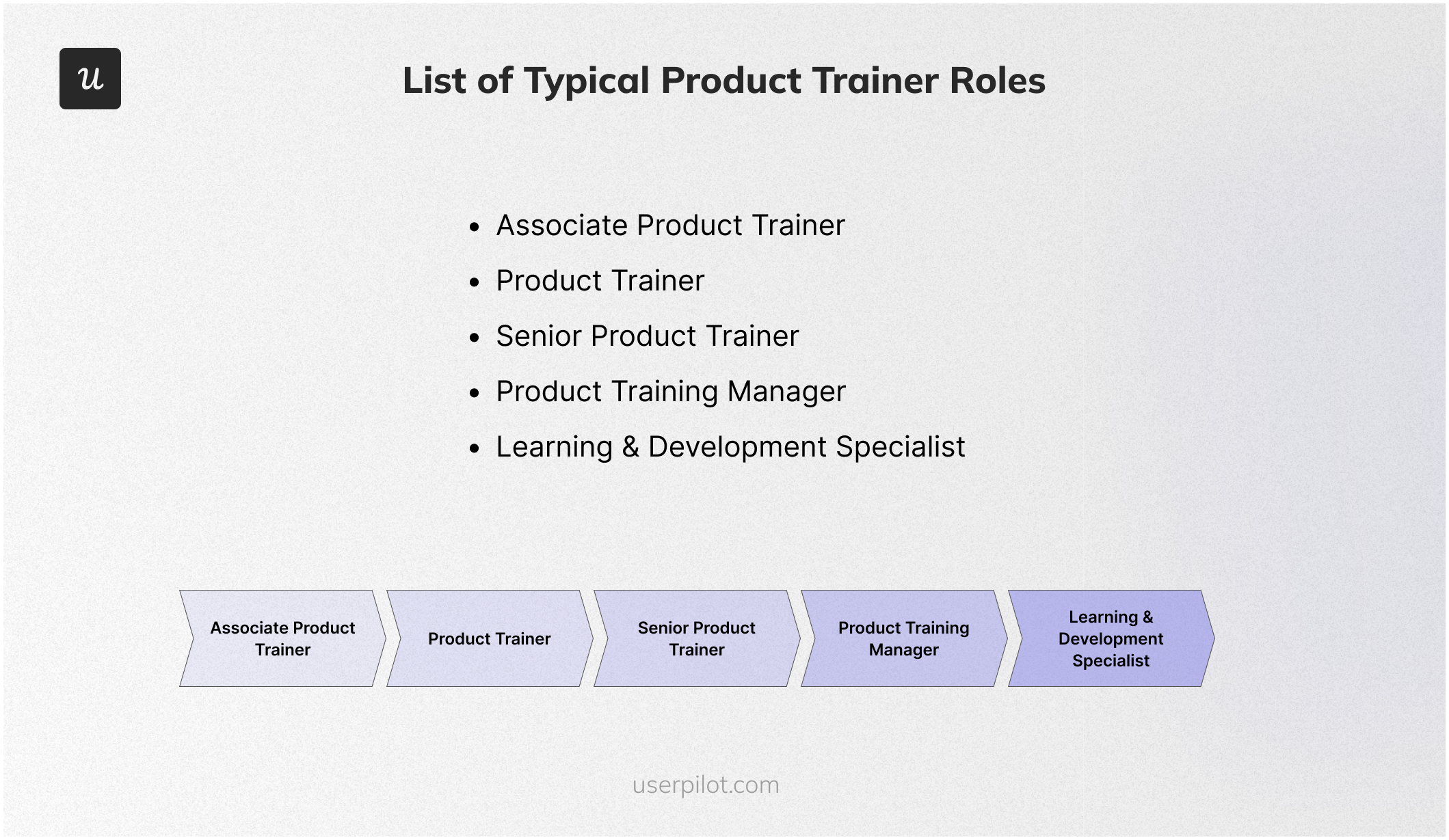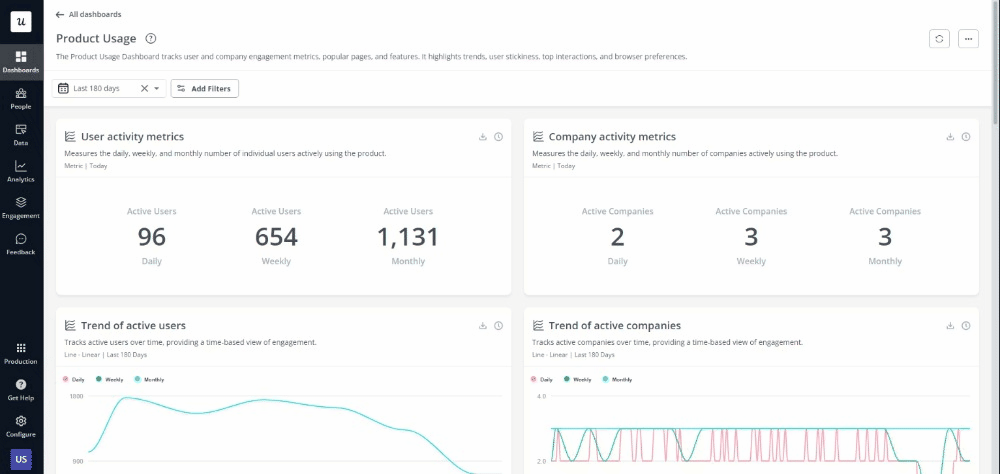![How to Become a Product Trainer [+Tools and Resources]](https://blog-static.userpilot.com/blog/wp-content/uploads/2024/07/How-to-become-a-Product-Tools-and-resources-450x295.png)
Try Userpilot Now
See Why 1,000+ Teams Choose Userpilot

Product trainer’s main responsibilities
Product trainers play a crucial role in ensuring that employees, customers, or partners understand and effectively use a company’s products or services. Their responsibilities are diverse and can vary depending on the industry, company size, and product complexity. However, here are some core duties:
- Design and develop training materials, including presentations, workshops, webinars, e-learning modules, and hands-on exercises.
- Deliver engaging and informative training sessions tailored to different audiences and learning styles (i.e. onboarding new employees and customers on product usage).
- Troubleshooting technical issues and providing product support.
- Stay up-to-date on product updates, new releases, and industry trends.
- Gather feedback from trainees and stakeholders to assess training needs and identify areas for improvement.
Product trainer career path

The product trainer role offers a rewarding career path with opportunities for advancement. Here’s a roadmap outlining potential progression paths:
- Associate Product Trainer (1-3 years): Assist senior trainers with user onboarding, create training materials, and gain a strong understanding of the product.
- Product Trainer (3-5 years): Design and deliver comprehensive training programs for various user groups using your training skills and product knowledge.
- Senior Product Trainer (5+ years): Lead and manage a team of trainers, develop training strategies, and ensure high-quality training experiences.
- Product Training Manager (7+ years): Oversee the entire product training function, manage budgets, and ensure training aligns with business goals.
- Learning & Development Specialist (8+ years): Lead the broader learning and development function, encompassing product training and other areas like employee onboarding.
How to become a product trainer?
Becoming a product trainer involves developing a blend of expertise in the product you are training on, strong communication skills, and a knack for teaching. Here’s a roadmap to get you started:
Education and foundation:
- Formal education (optional but valuable): A bachelor’s degree in Training and Development, Instructional Design, Education, or a related field can provide a strong foundation in adult learning principles and instructional methods. While not always mandatory, it can be a plus for employers, especially for senior positions.
- Self-learning: If you don’t have a formal degree, don’t fret. Many online courses and certifications are available in product training, instructional design, and adult learning methodologies. Sites like Coursera, Udemy, and LinkedIn Learning offer a wealth of options.
Experience and skill building:
- Start in a related field: Look for entry-level positions in Learning and Development, Customer Success, or Technical Support. These roles can expose you to training principles and content creation, even if it’s not product-specific.
- Seek an internship: If you’re a student or early in your career, consider an internship focused on training or instructional design. This can provide valuable hands-on experience and build your resume.
- Network and learn from others: Connect with product trainers on LinkedIn or online communities. Shadowing experienced trainers can offer invaluable insights into their work and presentation techniques.
Building your product expertise:
- Focus on a specific industry: Research industries that interest you and delve deep into their typical products. This focused knowledge will be highly sought-after by potential employers.
- Build your tool knowledge: Familiarize yourself with the onboarding tools and Learning Management Systems (LMS) commonly used in the industry, i.e. Userpilot for user onboarding, Walkme or Coassemble for employee onboarding, etc.
- Become a product power user: Get to know the product inside and out. Explore all its features, delve into user manuals and documentation, and actively use the product yourself. This deep understanding will make you a more credible trainer.
What skills should a product trainer have?
A successful product trainer possesses a diverse skill set that combines technical knowledge, instructional capabilities, and interpersonal skills.
Here’s the skill set breakdown for product trainers:
- Product knowledge: An in-depth understanding of the product’s features, functionalities, and limitations is paramount. Trainers should be able to answer any user questions and demonstrate product capabilities with ease.
- Technical proficiency: Depending on the product’s complexity, familiarity with relevant technologies or coding languages might be necessary.
- Instructional design: The ability to create engaging and well-structured training materials, including presentations, tutorials, and interactive guidance.
- Technical support: Basic troubleshooting skills can help address user issues encountered during training.
- Tool knowledge: Familiarity with user onboarding and training creation tools like Userpilot – popular for product onboarding, WalkMe – widely used for employee onboarding experiences, etc.
- Communication and presentation skills: These are essential to captivate the audience and deliver information.
Best certifications for product trainers
The best certification choice for you will depend on your specific career goals and interests. Nonetheless, here are some of the most highly regarded and widely recognized certifications for product trainers:
- Certified Professional in Learning and Performance (CPLP): This is considered the gold standard for training professionals. It covers a wide range of competencies, from instructional design and delivery to evaluation and performance improvement.
- Certified Professional in Training Management (CPTM): This certification focuses on the management aspects of training programs, making it ideal for trainers who aspire to leadership roles.
- Certified Professional in Online Learning (CPOL): This certification from the Association for Talent Development (ATD) focuses on the design and delivery of online learning experiences. It covers topics such as e-learning design principles, technology tools, and learner engagement strategies.
- Certified Scrum Product Owner (CSPO): This certification focuses on Agile product management principles and practices. It equips trainers with the skills to effectively manage product backlogs, prioritize features, and collaborate with development teams.
Best resources for product trainers
Product trainers play a crucial role in driving user adoption and ensuring the success of any product. Here are some of the best resources for product trainers, categorized to help you find exactly what you need:
Best books for product trainers
To excel in this role, continuous learning and development are essential. Here are five books highly recommended for product trainers, covering various aspects of training, product management, and customer success:
- “Telling Ain’t Training” by Harold D. Stolovitch & Erica J. Keeps: A classic on the science of adult learning and how to design effective training programs.
- “Design for How People Learn” by Julie Dirksen: Explores cognitive science principles and translates them into actionable strategies for creating engaging learning experiences.
- “The Lean Product Playbook” by Dan Olsen: Provides a framework for building products that customers love, with valuable insights for trainers on understanding customer needs and validating product ideas.
- “The Effortless Experience” by Matthew Dixon, Nick Toman & Rick DeLisi: Provides a framework for delivering low-effort customer experiences and improving customer loyalty.
- “The Challenger Sale” by Matthew Dixon & Brent Adamson: Offers insights on how to challenge customers’ assumptions and create buying urgency, relevant for trainers involved in sales enablement.
Best webinars for product trainers
Webinars offer a convenient and accessible way to gain valuable insights, learn new strategies, and connect with industry experts. Here are some highly recommended webinar sources for product trainers:
- Userpilot Events: Focuses on product growth and user onboarding, crucial for understanding user behavior and crafting effective training programs. Their webinars cover topics like user journey optimization, feature adoption analytics, and user engagement strategies – all feeding directly into your training initiatives.
- Mind the Product Webinars: Known for their high-quality webinars on various product management topics, including training and onboarding. Their sessions often feature industry experts sharing their knowledge and experience.
- Pragmatic Institute Webinars: Provides webinars on various aspects of product management, including training and development. Their sessions often focus on practical skills and real-world scenarios.
- Product-Led Growth Collective Webinars: This community-driven platform offers webinars on various aspects of product-led growth, including user onboarding and product adoption.
Best blogs for product trainers
Here are some of the best blogs for product trainers, offering practical guides, expert interviews, and actionable advice:
- Userpilot Blog: Offers in-depth guides, case studies, and actionable advice on creating effective onboarding experiences, improving product adoption, and driving user engagement.
- Product Talk: Features interviews with product leaders and experts, offering insights into their strategies and tactics. Covers a wide range of industries and company sizes.
- Roman Pichler’s Blog: Offers in-depth articles and resources on applying agile methodologies to product management. Provides valuable insights for trainers who want to create flexible and adaptable training programs.
- ProductPlan Blog: Provides practical advice and templates for creating effective product roadmaps. It also offers insights into prioritizing features, aligning stakeholders, and communicating product strategy.
Best podcasts for product trainers
Curious about what the top product trainers are listening to? These are the podcasts generating buzz in the community, packed with insights and discussions to help you stay updated:
- The Product Experience: Hosted by product experts Lily Smith and Randy Silver, this podcast goes deep with industry leaders, covering a wide range of topics relevant to training, including user onboarding, product adoption, and customer success.
- Rocketship.fm: It is a great podcast for getting inspired and motivated. It’s packed with stories of entrepreneurs who have overcome challenges and built amazing products.
- Masters of Scale: Hosted by Reid Hoffman (co-founder of LinkedIn), this podcast explores how companies grow from zero to a gazillion. While not directly focused on training, it offers valuable lessons on scaling products and building successful teams.
- The Knowledge Project: Hosted by Shane Parrish, this podcast features in-depth conversations with experts from various fields. Trainers can gain insights into topics relevant to their work, such as learning, communication, and decision-making.
Best tools for product trainers
As a product trainer, leveraging the right tools can make all the difference in delivering high-quality, impactful training experiences.
So here are the top 10 tools that product trainers can use to create effective training programs:
- Userpilot: Userpilot is your one-stop shop for creating smooth and engaging user onboarding experiences. With interactive walkthroughs, targeted messages, and personalized guidance, you’ll have users mastering your product in no time. The data-driven insights also help you continuously refine your training strategy.
- Pendo: This product experience platform provides deep insights into how users interact with software. By understanding user behavior and gathering feedback, trainers can tailor their materials to real user needs and drive product improvements.
- Appcues: A low-code user onboarding platform that works for both web and mobile applications. It simplifies the creation of intuitive walkthroughs and tooltips.
- UserGuiding: Similar to Appcues, UserGuiding also offers user surveys and NPS tools. This enables trainers to gather valuable feedback during the onboarding process.
- WalkMe: Reduces the need for manual support by guiding users through complex tasks and processes. It also comes with AI chatbots to provide real-time assistance.
- Usetiful: Usetiful’s flexibility allows trainers to create a variety of training materials for different stages of the user journey.
- HelpHero: It is a knowledge base platform that allows you to build a self-service resource center for users.
- HelpScout: It is a customer support platform with a robust help desk and live chat features.
- Intercom: Intercom allows trainers to proactively engage with users and offer personalized support with targeted messages and AI chatbots.
- Spekit: Spekit is a just-in-time learning platform that integrates with various tools to deliver contextual training and knowledge reinforcement.
Product trainer FAQs
What is the role of a product trainer?
A product trainer is a professional responsible for educating and empowering individuals on the effective use of a company’s products or services. They play a crucial role in ensuring that customers, employees, or partners understand the features, benefits, and best practices associated with the product.
What is a product trainee?
A product trainee is an individual who is undergoing training to become a product trainer. They are typically new to the role and are learning the necessary skills and knowledge to develop and deliver effective training programs.
What is a technical product trainer?
A technical product trainer specializes in educating users on the technical aspects of a product or service. They possess a deep understanding of the product’s technology and functionality. Their training sessions often involve in-depth demonstrations, hands-on exercises, and troubleshooting technical issues.
Conclusion
Becoming a successful product trainer requires dedication, continuous learning, and a proactive approach to developing relevant skills.
By following the outlined steps and leveraging the resources available, you can effectively navigate your career path and achieve your professional goals.
We hope this guide has provided you with valuable insights and practical advice to help you on your journey to becoming a proficient and impactful product trainer!
Looking into tools for product trainers? Userpilot is an all-in-one product platform with engagement features and powerful analytics capabilities. Book a demo to see it in action!








